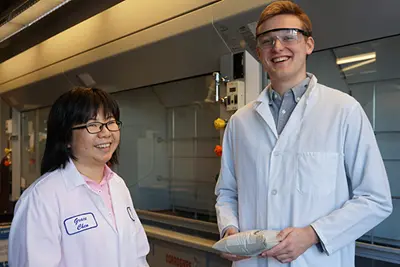Leadership Team Holds Kickoff Event Dec. 13 to Discuss Goals, Solicit Faculty Input
 Image by Tory Wesnofske
Image by Tory Wesnofske
11/30/2021
By Katharine Webster
Changing any campus culture is hard, but UMass Lowell has made inroads under a National Science Foundation (NSF) grant that aimed to remove career barriers for women faculty in science, technology, engineering and math.
Making WAVES (Women Academics Valued and Engaged in STEM), which launched in 2016, was supported by a five-year, $3.5 million ADVANCE Institutional Transformation grant awarded to the Center for Women and Work.
Now, the grant is winding down – but the institutional transformation it promises is just getting started.
 Image by Tory Wesnofske
Image by Tory Wesnofske
“It’s by faculty and for faculty,” says Psychology Prof. Meg Bond, who is serving as faculty director of the new office. “We want faculty from across the campus to help us build upon our success and develop new programs that promote equity.”
The new office, with Program Director Brita Dean, a leadership team of full-time faculty and a broad advisory board, builds on programs that were created and tested under Making WAVES.
Making WAVES research led by Bond and Psychology Assoc. Prof. Michelle Haynes-Baratz included campus climate surveys of full-time faculty and daily bias surveys both inside and outside UML to better understand what issues presented barriers to faculty success.
The Making WAVES team also created and tested practical interventions to address gender bias, including training faculty “bystanders” to intervene when women faculty are subjected to subtle bias in the form of microaggressions – everyday slights, stereotypes and indignities that seem minor when viewed individually, but that can add up to make the recipient feel like a misunderstood or unwanted outsider.
 Image by Adrien Bisson
Image by Adrien Bisson
Making WAVES also provided alternatives to traditional mentoring programs and worked with UML’s colleges and departments to bring greater equity and accountability to their hiring, promotion and tenure practices. Likewise, it identified and addressed university-wide structures and norms that can contribute to discrimination and inequality.
Among the research findings by Making WAVES was that the bystander training was effective in teaching faculty how to intervene when they witnessed a microaggression. In follow-up surveys, faculty who had gone through the training reported intervening more often, says Tugba Metinyurt, a post-doctoral fellow who also worked on Making WAVES research as a master’s and Ph.D. student.
“The subtlety of microaggressions can mean people have a hard time putting their finger on them and knowing how to respond,” she says.
 Image by Courtesy
Image by Courtesy
“Ignoring this more subtle and insidious form of bias can be equally harmful. Due to chronic stress, it can cause physical problems and mental health problems,” she says. “That’s why it’s crucial to address the workplace culture by establishing new social norms within the classroom, the workplace and society.”
Other research using faculty focus groups, led by Biomedical Engineering Prof. Laura Punnett and the Center for the Promotion of Health in the New England Workplace, found that faculty thought that UML’s overall equity climate had improved over the past few years. Although the focus groups didn’t know that they were evaluating Making WAVES, many of the improvements they cited were connected to the program.
 Image by Adrien Bisson
Image by Adrien Bisson
The Making WAVES team will present the results of their research to the campus community online on Dec. 1 and in person on Dec. 9. That will be followed by an in-person kickoff event for the ADVANCE Office for Faculty Equity on Dec. 13, when the leadership team will talk about their equity goals and invite faculty to help develop new initiatives or expand and improve on those that are already underway.
“We’re looking at how we can create the supports and resources for some of these things to emerge organically,” Bond says.
One widespread concern the office plans to address is equity in faculty service assignments, such as advising, directing undergraduate and graduate programs, and serving on committees, Bond says. Another is the need for more places and groups where faculty can share their personal and professional challenges – and find support.
 Image by Tory Wesnofske
Image by Tory Wesnofske
The new office will also offer support to existing efforts, such as peer mentoring groups and launch programs for new faculty, and it will collaborate with or help to implement the recommendations of other university equity groups, including a “Family Friendly Campus” initiative led by English Assoc. Prof. Jenna Vinson, the 2019 Task Force on Sexual Harassment, and the ongoing Council on Social Justice and Inclusion.
The original Making WAVES leadership team included Bond, Vice Chancellor for Research and Innovation Julie Chen, Haynes-Baratz, Chemistry Prof. Marina Ruths and Plastics Engineering Assoc. Prof. Meg Sobkowicz-Kline.
They will all continue to serve on the ADVANCE Office for Faculty Equity leadership team and will be joined by Management Asst. Prof. Karoline Evans, History Prof. Robert Forrant, Mechanical Engineering Assoc. Prof. Christopher Hansen and Biomedical Engineering Asst. Teaching Prof. Yanfen Li. Punnett serves as chair of the advisory board.




